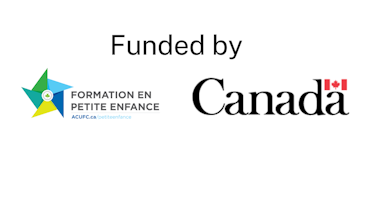"Café de Paris" French Conversation Workshops for Healthcare and Social Services Professionals
These workshops offer a friendly setting for healthcare professionals wishing to develop their French speaking and listening comprehension skills.
Free
Our cookies and those of our partners help improve your experience and analyze your use of the website. To learn all about cookies, check our privacy policy
In 2022, Collège Nordique took a significant initiative by offering a training course entitled Gonàowoo Dehshe, which means “our way of life grows” in Tłı̨chǫ Yatıı̀. The training aimed to equip early childhood education specialists in the Northwest Territories (NWT) to act towards reconciliation by learning about Dene culture.
This training was the result of the efforts of a working group and a discussion group set up by Collège Nordique. Both groups were made up of cultural experts and early childhood experts to develop a training program for Francophone educational staff.
The cultural and language experts recommended the adoption of the name Gonàowoò Dehshe, which reflects the recognition and valorization of Dene culture through the transmission of their values, way of life and know-how.
The project was born out ofneed.
The lack of resources and training in French in the NWT for people working in early childhood motivated this initiative. Its main objective? To equip educators to act towards reconciliation. Many immigrants and people from other parts of Canada know little about Indigenous Peoples and their cultures. The aim of this project was therefore to raise awareness among non-Indigenous French-speaking educators of the reality of living and working on Indigenous land, to encourage encounters with Dene people, and to offer an insight into Indigenous cultures.
The training was the result of collaboration between members of the NWT's Indigenous communities, early childhood specialists and the CNF.
From the classroom to the land...
On January 12, 2023, training was given to ten Francophone educators living in the NWT. The program included three practical workshops and a pedagogical guide, to support Francophone educators in their reconciliation process.
The first day was devoted to the history of Indigenous Peoples: participants immersed themselves in history, from the arrival of settlers to the reality of the effects of colonization in the NWT. They took part in the Blanket Exercise at the Collège, a poignant activity that revisits the relationship between the Indigenous Peoples and the settlers through the eyes of the Indigenous people. The exercise, accompanied by testimonials from residential school survivors, aroused strong emotions among those present. Sarah Mbau, an educator at the Plein Soleil daycare center, shared her feelings:
“Honestly, this morning was really emotional. It hurt to think about the history of Indigenous Peoples and everything they've been through”.
Another participant also emphasized the impact of the exercise:
“I learned with the Blanket Exercise that it was more real by doing it. Instead of just talking about it. It was very touching''
Following the advice of the Indigenous members of the consultation committee, this moving activity was followed by a medicine walk to reinforce Dene teachings of learning from the land.
Practical, enriching activities.
The following days focused on activities such as fish filleting and bannock preparation, supervised by Dene Elders and Knowledge -Holders. These activities allowed participants to immerse themselves in Dene traditions and know-how, far from classrooms and textbooks.
“I learned how to cut and fillet a fish,” said one educator.
This hands-on approach was reinforced by the presence of two interpreters, facilitating communication between the English-speaking Indigenous Elders and Knowledge Holders and the French-speaking participants.
Training results and impact.
Gonàowoo Dehshe fully achieved its objectives. Participants were able to express their impressions, observations and lessons learned from the training through an anonymous survey, noting that they had immersed themselves in the culture thanks to the warm Dene greetings and Indigenous stories. They also noted that they had acquired new knowledge, such as gratitude towards nature and appreciation of what it offers and had finally connected links with members of the Dene communities.
Thanks to this training, educators now feel better equipped to integrate iIndigenous activities and perspectives into their teaching. At the end of the training, two educators declared:
“From now on, I'm thinking of doing the hugging circle activity with the children outside the daycare” and “I'm going to introduce more books on Indigenous cultures, more walking in the forest and in nature”.
Marie-France Lanteigne, Director of Training and Student Success at Collège Nordique, was pleased to note the participants' openness and willingness to learn:
“We can see there's an openness, people want to learn, so it's positive''
Another step towards reconciliation.
The Gonàowoo Dehshe training marks an important step towards reconciliation in early childhood education in the NWT. By integrating Indigenous knowledge and perspectives, this initiative strengthens the ability of Francophone educators to deliver a more respectful and inclusive education. The CNF, in collaboration with Indigenous communities, continues to work towards a future where cultural diversity is not only recognized, but celebrated and integrated into early childhood education.
If you would like to find out more about the CNF's early childhood training courses:
If you would like to read the Radio-Canada and CBC News articles on Gonàowoo Dehshe :

Loading
Thank you for subscribing